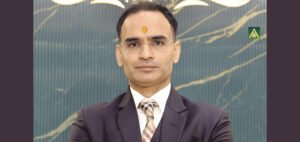How Tradition and Innovation Blend in the Creation of Timeless Pieces!
Sometimes a journey often begins in unexpected ways, shaped by the legacy of our elders. In the world of jewelry, where craftsmanship meets artistry, Osama Karam Imseeh found inspiration to join the family business.
His path into the jewelry industry was not what he had originally planned. Encircled by the glitter of gold and the detailed designs that enriched his father’s workspace, he found a passion that went beyond simple business.
In addition to developing his abilities, it gave him a deep appreciation for the cultural and financial value of jewels. He came to understand that jewelry is more than just ornamentation as he worked his way through the industry’s complexity; it is a symbol of history, ambition, and a lasting link to tradition.
Osama stands at the helm as the Chairman of the Imseeh Group, a prominent name in Jordan’s jewelry landscape. His journey began not out of obligation but as a response to a call he initially resisted. Over time, his dedication to the family business evolved into a passion for excellence.
Under his leadership, the business has expanded its reach, establishing branches in Dubai and Istanbul, and becoming a pioneer in the region with Jordan’s first gold refinery. This facility not only enhances local capabilities but also symbolizes a commitment to quality that resonates across 54 countries.
His vision extends beyond business; he actively engages in community initiatives, fostering education and skills development among youth, thereby ensuring that his legacy impacts future generations.
Let’s know more about his journey:
Osama: A Journey Back to Roots
Osama serves as the chairman of the Imseeh Group in Jordan and previously held the position of Head of the Jewelry Syndicate for fourteen years until his resignation in 2021. Initially, he did not envision a career in the family business, as he had other aspirations. However, growing up alongside his father, who was deeply committed to the gold trade, profoundly influenced him.
Over time, he recognized the importance of gold, not merely as a commodity but as a vital asset for individuals and nations. Although it was not his original dream to join the family business, a sense of faith and familial duty ultimately drew him back. Today, he embraces his role with passion and appreciation, having developed a genuine love for the jewelry industry that he once viewed from a distance.
The Legacy of Imseeh Group: A Journey Through Time
The Imseeh Group’s legacy began before 1957 as a humble home-based workshop founded by his late father, Karam Imseeh, who learned the art of gold manufacturing through self-education and perseverance. His dedication to the craft led him to train young apprentices, ensuring the transfer of valuable skills. In the early 1960s, Karam partnered with a friend to establish a small shop in Amman’s Gold Souk while continuing production in his workshop. He expanded the business by importing gold and gemstones and crafting exquisite products for re-export.
Karam’s keen market insight allowed him to identify gaps and cater to specific needs, laying the groundwork for the company’s enduring success. Today, the Imseeh Group honors his legacy with operations that include branches in Dubai and Istanbul, a state-of-the-art factory, and the first gold refinery in the region. With a wholesale office in Jordan, Imseeh exports its products to 54 countries worldwide in the gold trade that has spanned generations.
A Natural Progression in the Jewelry Industry
Osama’s journey in the jewelry industry evolved organically rather than through a predetermined ambition to lead the Imseeh Group. As the eldest son, he began assisting his late father early in life, responding to the increasing demands of their growing business. Throughout his school and university years, he balanced his education with responsibilities in the family enterprise, often stepping in during critical moments. His father played a pivotal role in his development, imparting essential knowledge about managing accounts, customer relations, and banking partnerships.
This hands-on experience, coupled with his father’s mentorship, naturally equipped him to assume leadership of the business. He embraced the opportunity to ensure its continued growth and success. Today, he stands as the chairman of Imseeh Jewelry, committed to honoring his father’s legacy while driving innovation and excellence within the industry.
Upholding Core Values in Leadership
In his leadership role, Osama emphasizes core values deeply rooted in his family’s legacy, particularly those instilled by his late father. Integrity stands at the forefront, as he believes in the importance of keeping promises and treating clients with respect. He views a commitment to one’s word as binding as a signature. He advocates for treating customers as one would like to be treated, promoting fairness and ethical practices without resorting to greed or shortcuts.
These principles shape the company culture at Imseeh Jewelry, where employees are inspired to follow the example set by their leaders. Those who cannot align with these values often find it challenging to fit within the organization. Additionally, his commitment to helping others is not merely a corporate strategy but a reflection of his character, fostering a culture of compassion and ethical responsibility that permeates the entire company. This approach ensures a supportive environment for both employees and clients alike.
Milestones in Leadership
Osama takes pride in several significant projects during his career, with two standing out as pivotal achievements. The first was the introduction of an innovative tax system for the gold and jewelry industry in Jordan while he served as the head of the Jewelry Syndicate. Despite facing initial resistance from various stakeholders, he remained committed to the idea, and after three years of persistent effort, the system was adopted. This initiative not only increased government revenues but also eased challenges for manufacturers and retailers, transforming the industry.
The second project that holds personal significance for him involved developing a solution for managing communal lands, a pressing issue affecting landowners and government infrastructure spending. This initiative streamlined processes and reduced costs, becoming a cornerstone for economic improvement in Jordan. Both projects reflect his dedication to addressing complex challenges with practical, sustainable solutions that benefit the broader community.
Embracing Innovation and Technology
Osama recognizes that innovation is essential for the success of his company and for maintaining a competitive edge in the jewelry industry. He believes that relying solely on traditional methods can hinder progress. To combat this, Imseeh Group focuses on product development, creative customer engagement, and exceptional service offerings. A notable initiative was the partnership with Royal Jordanian Airlines, allowing customers to earn air miles on jewelry purchases, an innovative loyalty program in the sector. Additionally, he introduced free insurance for customers, providing coverage against theft or robbery.
In terms of product innovation, the company has developed unique jewelry designs and explored various gold colors and finishes over the years. Technology plays a crucial role in their strategy, with the integration of ERP systems facilitating effective decision-making through real-time data. Advancements in manufacturing technology, such as 3D printing and electroforming, enhance efficiency and innovation. Staying ahead of these technological trends and being an early adopter he ensures that they continue to lead the industry and avoid falling behind.
Advice for Aspiring Jewelry Entrepreneurs
Osama advises young entrepreneurs entering the jewelry market to establish a strong differentiator that sets them apart from competitors. This could be a unique concept, innovative designs, or exceptional products. He emphasizes the importance of securing adequate capital and funding sources to support sustainable growth. Additionally, entrepreneurs should focus on three key elements: people, place, and product, which are essential for building a solid foundation in this competitive industry.
He highlights that creativity and innovation are crucial for success. Without a distinct edge, it can be challenging to stand out in the crowded jewelry market. By fostering a culture of innovation and continually seeking new ideas, aspiring jewelers can navigate the dynamic landscape and thrive. He encourages young entrepreneurs to embrace their creativity and remain adaptable to ensure long-term success in the jewelry sector.
Key Factors for Building a Luxury Brand
Osama identifies several key factors essential for building a successful brand in the luxury goods sector. Creativity and innovation are crucial, as they help differentiate the brand in a competitive market. A luxury brand should have strong roots, a rich history, and an exceptional reputation, crafting a unique identity that resonates with consumers.
Corporate social responsibility (CSR) also plays a significant role, as meaningful contributions to society enhance the brand’s connection with its community. Furthermore, personal interactions and relationships with customers are vital; providing a personal touch fosters loyalty and elevates the overall brand experience. By combining these elements, creativity, heritage, social responsibility, and customer engagement, brands can establish themselves as leaders in the luxury market.
Balancing Tradition and Modernity in Jewelry
Osama emphasizes the importance of balancing tradition and modernity in his product offerings to remain relevant while honoring the brand’s heritage. Tradition is deeply rooted in the company, reflecting its rich history and values. However, to meet the evolving tastes of contemporary consumers, Imseeh Group incorporates new styles and global trends into its designs.
The company maintains a classical foundation for customers who appreciate timeless elegance but consistently adds a modern twist to keep offerings fresh and appealing. This approach ensures that traditional customers feel they are staying true to their classic taste while experiencing something new and distinct.
The Importance of Customer Feedback in Product Development
Osama views customer feedback as a crucial element in product development and decision-making. He emphasizes that gathering insights goes beyond mere opinions; it involves actively seeking input through surveys, suggestions, and complaints. This comprehensive approach helps the company understand customer preferences and perceptions of the brand, whether it is seen as traditional or modern.
Negative feedback, in particular, catalyzes improvement, prompting the company to address issues and enhance its offerings. While the brand is rooted in history, he recognizes the need to adapt to market trends. By staying connected with customers and gathering feedback on aspects like product pricing and after-sales service, Imseeh Group ensures it meets customer expectations. Ignoring this vital connection could lead to a loss of market share and ultimately, being left behind.
Insights from INJAZ Al-Arab Experience
Osama’s involvement with INJAZ Jordan has profoundly influenced his views on youth entrepreneurship and education. He describes the experience as enriching, where he learned as much as he contributed. Engaging with other CEOs across diverse industries provided him with valuable insights into management, leadership, and operational excellence.
What resonated most with him was witnessing the innovative ideas of young people, whose creativity is vital in a rapidly evolving technological landscape. This exposure reinforced his belief in nurturing the next generation of thinkers who challenge the status quo and shape the future. He emphasizes that supporting youth initiatives fosters an entrepreneurial spirit essential for economic growth and societal development, highlighting the importance of education in empowering young individuals to realize their potential and contribute meaningfully to their communities.




